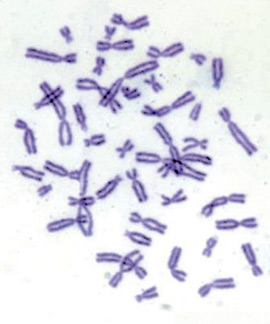End of men? Not just yet, say scientists investigating mysteries of
male Y chromosome
Reports of the demise of the male Y chromosome have been greatly
exaggerated according to scientists who believe that the "end of men" is
a gender apocalypse too far.
Two independent studies of the diminutive Y chromosome, which is
inherited solely down the male line, have failed to find evidence to
support the widely held theory that its evolutionary days - and those of
its owner - are numbered.
|

Human chromosomes under microscope |
A detailed genetic analysis of the Y chromosomes of a wide range of
mammalian species, including humans, shows that far from continuing to
wither away unremittingly, it has remained remarkably stable for at
least the past 25 million years.
The research also found that the few remaining genes on the Y
chromosome include some that perform vital regulatory control of other
genes that are active throughout a man's body - making each of his cells
distinctly and subtly different from those of a woman. This would
suggest that medical treatments should in future be tailored more
towards a patient's gender, and that doctors may have more reason to
treat men and women differently according to their sex, said Prof David
Page, director of the Whitehead Institute for Biomedical Research in
Cambridge, Massachusetts.
"There is a clear need to move beyond a unisex model of biomedical
research, which means we need to move beyond a unisex model of our
understanding and treatment of disease," said Prof Page, who led one
Henrik Kaessmann of the University of Lausanne, who led the other team,
said that the findings explode the myth that the Y chromosome is
primarily about the genes involved in male reproduction.
"Now it is clear that the Y chromosome is not specific to males so to
speak but also important for functions throughout the body," Prof
Kaessmann said.
Men inherit both a Y and an X chromosome, and women have two X
chromosomes. However, scientists believe the Y chromosome is a withered
remnant of the X chromosome from which it originally evolved. Hundreds
of millions of years ago, genetic decay ravaged the Y chromosome,
leaving it with just three per cent of its ancestral genes, compared
with 98 percent on the corresponding X chromosome of women.
This rapid loss of genetic function was widely seen as a portent of a
premature demise for the Y chromosome, and of the male sex in general.
- The Independent
|

